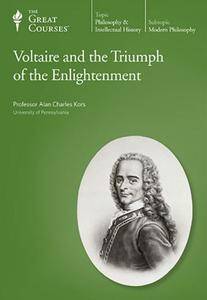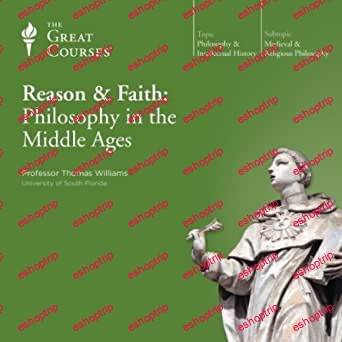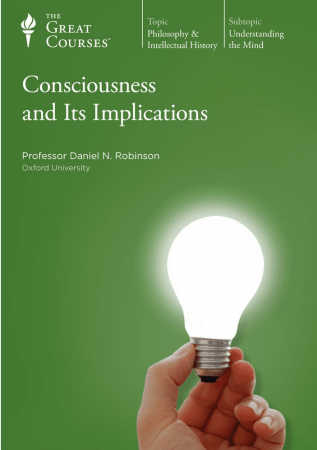Course No. 452 | .AVI, DivX, 1000 kbps, 640×480 | English, MP3, 128 kbps, 2 Ch | 12×30 mins | + PDF Guidebook + Audiobook | 2.5 GB
Lecturer: Alan Charles Kors, Ph.D.
Leading intellectual historian Alan Charles Kors shares with you his view of Voltaire as one of the most intriguing, influential, and elusive thinkers of the modern world. Focusing on the deepest, most enduring aspects of Voltaire’s work and thought, but never losing sight of the colorful, fascinating man himself, Professor Kors sketches for you a vibrant, thought-provoking vision of Voltaire as “the father of the Enlightenment” and one of the great literary personalities of all time.
The “Father of the Enlightenment”
Voltaire lived for 84 astoundingly productive years (1694-1778), wrote hundreds of works in almost all the literary, philosophical, and polemical genres current in his day, and left behind more than 20,000 letters.
What was his world like? Who and what influenced him? What questions and dilemmas did he ponder? What evils did he struggle against? What reforms did he advocate? What made him laugh and cry, or write a book like Candide, which is at once so funny and so sad? And what is his place in the history of the Western mind?
According to Professor Kors, “his life both reflected and profoundly altered the movement we now call the ‘Enlightenment.’ He wrote in almost every literary genre—from light verse to epic poem, drama, narrative fiction, essay, dictionary, philosophical treatise, and scientific popularization—and virtually created a genre, the ‘philosophical tale,’ in which he has remained most alive for posterity.”
In more than two decades of distinguished teaching at Penn, Professor Kors has proven himself a top scholar and award-winning classroom performer. He has written numerous books and articles on French and British intellectual history, and has won two awards for distinguished college teaching and several awards for the defense of academic freedom. He is the editor-in-chief of the Oxford University Press Encyclopedia of the Enlightenment.
Elusive Thinking and Philosophical Tales
Encouraged in his youth to write—he was an excellent poet by the age of 11 or 12—Voltaire continued at his craft until his death at the age of 84.
His collected works take up more than a hundred dense volumes of published texts and more than a hundred volumes of correspondence.
For the 18th century, he was a master of theater, epic poetry, serious and light verse, essays, histories, philosophical treatises, polemical pieces, scientific popularizations, and a genre that he developed and made his own.
In early 18th-century Paris, Voltaire was exposed to great philosophical debates and new religious ideas. He seemed on the verge of success until a quarrel caused a four-year exile to England that reshaped his outlook.
Voltaire was impressed by Bacon, Newton, and Locke, and by the prospect that knowledge gained from experience can improve the human condition. His Philosophical Letters (1734) explained and popularized British empiricism.
In this book, Voltaire contrasted his idealized portrait of prosperous, free, and tolerant England with the aristocracy, intolerance, and traditionalism of France. In some chapters, he accomplished nothing less than a revaluation of what is important to a progressive and free human life.
Banished from Paris, Voltaire sought refuge with the Marquise du Châtelet, a remarkable thinker who had mastered the intellectual legacies of the 17th century. His 15 years with her turned out to be the most productive of his life.
Her death in 1749 threw Voltaire into a long period of sorrow and uncertainty that ended with the publication of his most enduring philosophical tale: Candide, or Optimism (1759). With Candide—and in part to his own surprise—he became a crusader for “the party of humanity.”
He wrote many plays and poems, but his many “philosophical tales,” including Candide, became the prime vehicles for his ideas and made him the most widely read Enlightenment author.
Cultivating the “Human Garden”
At the end of Candide, Voltaire calls for cultivation of the “human garden” as the only antidote to despair. At his estate at Ferney on the Swiss border, he took his own advice both literally and metaphorically—and rose to the peak of his public influence.
Voltaire became a crusader for causes of the Enlightenment. He flooded Europe with his work, almost none of which appeared under his own name.
He had over 1,700 correspondents, from peasants to kings, and he used his letters to incite people to his causes, rail against injustice, propose reforms, and encourage young authors. He also used the correspondence to reveal which of the works that he had published anonymously or pseudonymously actually belonged to him.
Laughter was a weapon for Voltaire, and on any topic irony was essential to that laughter:
“To succeed in the world it is not enough to be stupid, you must also be well-mannered.”
“If God did not exist, it would be necessary to invent him.”
“It is dangerous to be right when the government is wrong.”
“Anything too stupid to be said is sung.”
“This agglomeration which was called and which still calls itself the Holy Roman Empire was neither holy, nor Roman, nor an empire.”
Voltaire and God
Throughout all of his intellectual life, Voltaire wrestled with the problem of knowledge of God. A convinced Deist, he opposes revealed religion and atheism with equal vigor even while wondering how to reconcile God’s existence with God’s providence.
However, no issue meant more to Voltaire than ending religious intolerance and persecution, and in no domain did he do more to change the conscience and the practices of European civilization.
He wrote, “I have, and can only have, no other goal but truth, but there is more than one truth, that time alone can disclose.”
“The Secret to Being Boring”
Voltaire once said: “The secret to being boring is to reveal everything.” Voltaire would not reveal everything; he frequently changed his mind on fundamental issues of politics, God and providence, formal philosophy, and ethics. For Voltaire, life overflowed the categories by which we try to contain it in human thought. One critic wrote that Voltaire was “a chaos of clear ideas.”
Voltaire wrote that a friend was sometimes Socrates, that is, always philosophically engaged and serious, and sometimes Epicurus, that is, always philosophically detached. He could have been writing about himself.
Perhaps the best way to sum up Voltaire is with a phrase for which he is often credited, but for which there is no clear evidence he actually uttered: “I may disagree with what you have to say, but I shall defend to the death your right to say it.”











Reviews
There are no reviews yet.